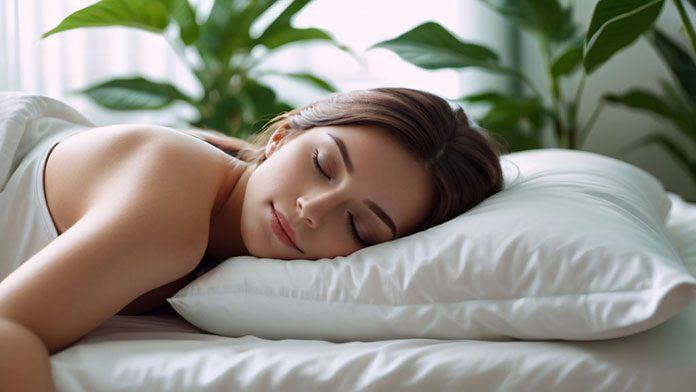Are you ready to explore the fascinating and often misunderstood connection between masturbation and mental health? Prepare to be amazed as we delve into the impact this seemingly taboo topic can have on your overall well-being.
Contrary to popular belief, masturbation is not just a physical act, but a complex process that can influence your anxiety, depression, stress levels, sleep quality, self-esteem, and more.
Get ready to debunk myths and uncover the truth about masturbation’s effects on your mental health.
Table of Contents

Related Video: "The Effects of Masturbation on Your Brain" by Psych2Go
Main Points
– Masturbation can alleviate symptoms of anxiety and depression by releasing endorphins and promoting relaxation.
– Excessive or compulsive masturbation can have negative effects on mental health, leading to feelings of guilt, shame, and exacerbating symptoms of depression.
– Masturbation has a positive impact on mood and cognitive function by releasing endorphins and increasing pleasure.
– Engaging in self-pleasure promotes relaxation, relief from negative thoughts, and boosts self-confidence.
The Relationship Between Masturbation and Anxiety

Explore the impact of masturbation on your anxiety levels.
Masturbation is a common and natural sexual activity that has been the subject of much discussion in relation to mental health. When it comes to anxiety, research suggests that there may be a connection between masturbation and its impact on anxiety levels, particularly in the context of social anxiety and panic disorders.
Social anxiety is characterized by a fear of being judged or evaluated by others, which can lead to avoidance of social situations. Masturbation can serve as a way to alleviate anxiety and provide a sense of control over one’s sexual experiences. Engaging in this activity can help individuals with social anxiety to cope with their fears and feel more comfortable in their own skin.
Similarly, individuals with panic disorders may find relief through masturbation. Panic attacks, which are sudden episodes of intense fear and physical symptoms, can be debilitating. Masturbation has been found to release endorphins, which can help reduce feelings of stress and anxiety.
While masturbation may provide temporary relief from anxiety symptoms, it’s important to note that it isn’t a substitute for professional treatment. If you’re experiencing social anxiety or panic disorders, it’s crucial to seek the guidance of a mental health professional who can provide appropriate support and treatment options.
Understanding the Connection Between Masturbation and Depression

When it comes to the connection between masturbation and depression, it’s important to consider both sides of the argument.
On one hand, some studies suggest that masturbation can alleviate symptoms of depression by releasing endorphins and promoting relaxation.
However, it’s crucial to acknowledge that excessive or compulsive masturbation can potentially have negative effects on mental health, leading to feelings of guilt, shame, and even exacerbating symptoms of depression.
Understanding the balance and individual factors at play is key in fully comprehending this complex relationship.
Masturbation Alleviates Depression
You can alleviate depression through masturbation. Masturbation has been shown to have a positive impact on mood and cognitive function. When you engage in masturbation, your brain releases endorphins, which are natural mood boosters. These endorphins help to reduce feelings of depression and increase feelings of pleasure and well-being.
Additionally, masturbation can help to ease stress and anxiety, which are often associated with depression. By engaging in self-pleasure, you can experience a sense of relaxation and relief, allowing your mind to focus on pleasure rather than negative thoughts and emotions.
Furthermore, the act of masturbation can also improve cognitive function by increasing blood flow to the brain, promoting mental clarity and alertness.
Negative Effects of Masturbation?
To fully understand the connection between masturbation and depression, it’s important to be aware of the potential negative effects that can arise from excessive or compulsive self-pleasure.
While masturbation is generally considered a normal and healthy sexual activity, engaging in it excessively or compulsively can have detrimental effects on mental health. One possible negative effect is the development of feelings of guilt or shame, which can contribute to depressive symptoms.
Additionally, excessive masturbation can lead to a decrease in motivation, social withdrawal, and a diminished sense of self-worth.
It’s crucial to maintain a balance and engage in masturbation in a healthy and moderate manner to avoid these negative consequences.
Understanding the potential negative effects can help individuals make informed decisions about their sexual behavior and overall mental well-being.
Exploring the Impact of Masturbation on Stress Levels

Masturbation can help reduce stress levels and promote overall mental well-being. When exploring the benefits of masturbation, it’s important to understand its impact on stress reduction.
Engaging in self-pleasure can provide a release of endorphins, also known as the ‘feel-good’ hormones, which can help alleviate stress and promote relaxation.
Research suggests that masturbation can lower cortisol levels, the hormone associated with stress. By engaging in pleasurable self-stimulation, you can experience a sense of relief and relaxation, leading to a decrease in stress levels. Masturbation also promotes the release of oxytocin, a hormone that’s known to reduce anxiety and improve mood. This can contribute to an overall sense of well-being and help manage stress more effectively.
Furthermore, masturbation provides an opportunity for self-care and self-exploration, allowing individuals to focus on their own pleasure and needs. This self-focused attention can serve as a form of stress relief and provide a sense of empowerment and control over one’s own body and pleasure.
It is important to note that the impact of masturbation on stress levels may vary from person to person. Factors such as individual preferences, cultural and religious beliefs, and personal experiences can influence the effectiveness of masturbation as a stress reduction tool. However, for many individuals, masturbation can be a healthy and natural way to alleviate stress and promote overall mental well-being.
The Effects of Masturbation on Sleep and Mental Well-being
Indulging in regular masturbation can have a positive impact on your sleep and overall mental well-being. Research suggests that masturbation can help improve sleep quality by promoting relaxation and releasing endorphins, which are natural mood-enhancing chemicals. When you engage in self-pleasure, your body releases oxytocin, a hormone that can induce feelings of calmness and contentment, making it easier for you to fall asleep and stay asleep throughout the night.
Moreover, masturbation has been found to have a positive effect on cognitive function. A study published in the Archives of Sexual Behavior found that individuals who masturbated frequently had better cognitive performance, including improved memory and attention span. This could be attributed to the increased blood flow and oxygenation to the brain during sexual arousal.
To further illustrate the benefits of masturbation on sleep and mental well-being, consider the following table:
| Benefits of Masturbation on Sleep and Mental Well-being | |
|---|---|
| Improved sleep quality | Enhanced mood |
| Reduced stress levels | Increased relaxation |
| Better cognitive function | Enhanced overall well-being |
Masturbation and Self-esteem: Examining the Link
When it comes to self-esteem, masturbation can have a positive impact on your confidence and overall mental well-being.
Engaging in solo sexual activity can provide a sense of self-empowerment and self-acceptance, allowing you to explore your own desires and preferences without judgment.
Additionally, the release of endorphins during orgasm can boost your mood and promote feelings of relaxation and contentment.
Masturbation and Self-Confidence
As you explore the link between masturbation and self-esteem, it becomes evident that there’s a significant impact on one’s overall self-confidence. Masturbation can influence how you perceive your body image and enhance your sexual satisfaction, which in turn can boost your self-confidence.
When engaging in masturbation, you’re intimately connected with your own body, allowing you to become more familiar with its features and develop a positive body image. This increased self-awareness and acceptance can lead to higher levels of self-esteem and confidence in your physical appearance.
Additionally, masturbation can provide sexual satisfaction and pleasure, which can contribute to a sense of empowerment and self-assurance. By exploring and understanding your own sexual desires and needs through masturbation, you can develop a stronger sense of self and confidence in your own sexuality.
Psychological Benefits of Masturbation
By regularly engaging in masturbation, you can experience a boost in self-esteem and confidence over time. Masturbation has been found to have various psychological benefits that contribute to improved mental well-being. Here are some ways in which masturbation can positively impact your psychological state:
– Masturbation and cognitive functioning: Research suggests that masturbation can enhance cognitive functioning by increasing blood flow and oxygenation to the brain. This improved cerebral circulation can lead to enhanced concentration, memory, and overall cognitive performance.
– Masturbation and emotional regulation: Masturbation can serve as a healthy outlet for managing and regulating emotions. It allows individuals to release built-up tension and stress, promoting a sense of relaxation and emotional relief. This can contribute to improved emotional well-being and a greater sense of self-control.
– Masturbation and self-discovery: Engaging in self-pleasure can help individuals explore their own bodies, desires, and preferences. This self-exploration can lead to a deeper understanding and acceptance of oneself, fostering a positive self-image and increased self-esteem.
Masturbation and Mental Health: Debunking Myths and Misconceptions
Don’t believe the misconceptions – masturbation has no negative impact on your mental health. Despite the myths and misconceptions surrounding masturbation, research has consistently shown that it is a normal and healthy sexual activity that can have positive effects on mental well-being. Let’s debunk some of the common myths and misconceptions associated with masturbation and mental health.
One misconception is that masturbation negatively affects body image. However, studies have actually found that individuals who engage in masturbation have higher body satisfaction and self-esteem. Masturbation allows individuals to explore and appreciate their own bodies, which can contribute to a more positive body image.
Another myth is that masturbation is only used as a way to escape or cope with trauma. While masturbation can be used as a coping mechanism for some individuals, it is important to note that it is not the sole or primary method of dealing with trauma. Masturbation can provide temporary relief and a sense of pleasure, but it is not a substitute for professional therapy or support.
To further clarify the debunked myths and misconceptions surrounding masturbation and mental health, the following table provides a visual representation of the ideas:
| Myth | Reality |
| Masturbation negatively affects body image | Masturbation is associated with higher body satisfaction and self-esteem |
| Masturbation is the only way to cope with trauma | Masturbation can be a temporary coping mechanism, but it is not a substitute for professional help |
Frequently Asked Questions
Can Masturbation Actually Worsen Symptoms of Anxiety?
Masturbation can actually worsen symptoms of anxiety. It can temporarily provide relief by releasing endorphins, but excessive or compulsive masturbation can lead to feelings of guilt, shame, and decreased self-esteem, ultimately exacerbating anxiety.
Is There a Difference in the Impact of Masturbation on Mental Health Between Men and Women?
There are gender differences in the psychological effects of masturbation. For women, masturbation can have psychological benefits such as stress relief and improved mood.
Can Excessive Masturbation Lead to Long-Term Feelings of Depression?
Excessive self pleasure, such as masturbation, can potentially lead to long-term feelings of depression. It is important to note that studies have shown a correlation between excessive masturbation and increased risk of mental health issues.
How Does Masturbation Affect Stress Levels and Can It Be Used as a Stress-Relief Technique?
Masturbation can impact stress levels and serve as a stress-relief technique. It can increase self-esteem and potentially help manage chronic pain. However, further research is needed to fully understand these effects.


